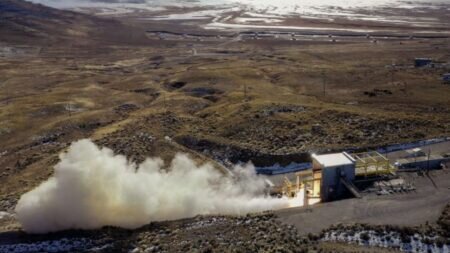Northrop Grumman Corporation successfully demonstrated its gateway technology in a flight test that proved the ability to connect airborne platforms with naval assets.
The first-of-its-kind demonstration was conducted with Naval Air Systems Command, Office of Naval Research, Naval Information Warfare Center Pacific and BAE Systems.
“Our gateways provide an open, secure and resilient solution needed to enable information advantage for our customers,” said Ben Davies, vice president and general manager, network information solutions, Northrop Grumman. “This powerful combination expands the mission sets of maritime platforms to deliver a seamlessly connected fleet – a critical step as the U.S. Navy achieves its naval operational architecture to enable distributed maritime operations.”
Equipped on Northrop Grumman’s MQ-4C Triton Flying Test Bed, the airborne gateway shared fifth-generation sensor data to ground-based simulators that represented an F-35, an E-2D Advanced Hawkeye, U.S. Navy Aegis class destroyers and carrier strike groups. The gateway integrated with Triton’s radar and artificial intelligence and machine learning capabilities to significantly enhance situational awareness across previously disconnected platforms. The addition of the gateway on Triton expands data sharing and will improve the warfighter’s ability to stay ahead of the adversary and make decisions faster across a vast and diverse environment.
“Triton’s altitude, persistence, and robust communication links make it an ideal candidate to host the Gateway system,” said Jane Bishop, vice president and general manager, global surveillance, Northrop Grumman. “This demonstration highlighted gateway technology enhancements to Triton that would enable information dominance across distributed maritime assets; including access to the F-35’s robust sensor suite and the E-2D’s battle management capabilities.”
Northrop Grumman recently demonstrated another gateway solution and also unveiled Australia’s first Triton. Northrop Grumman’s family of systems brings enhanced interoperability between joint and coalition forces across air and sea.









